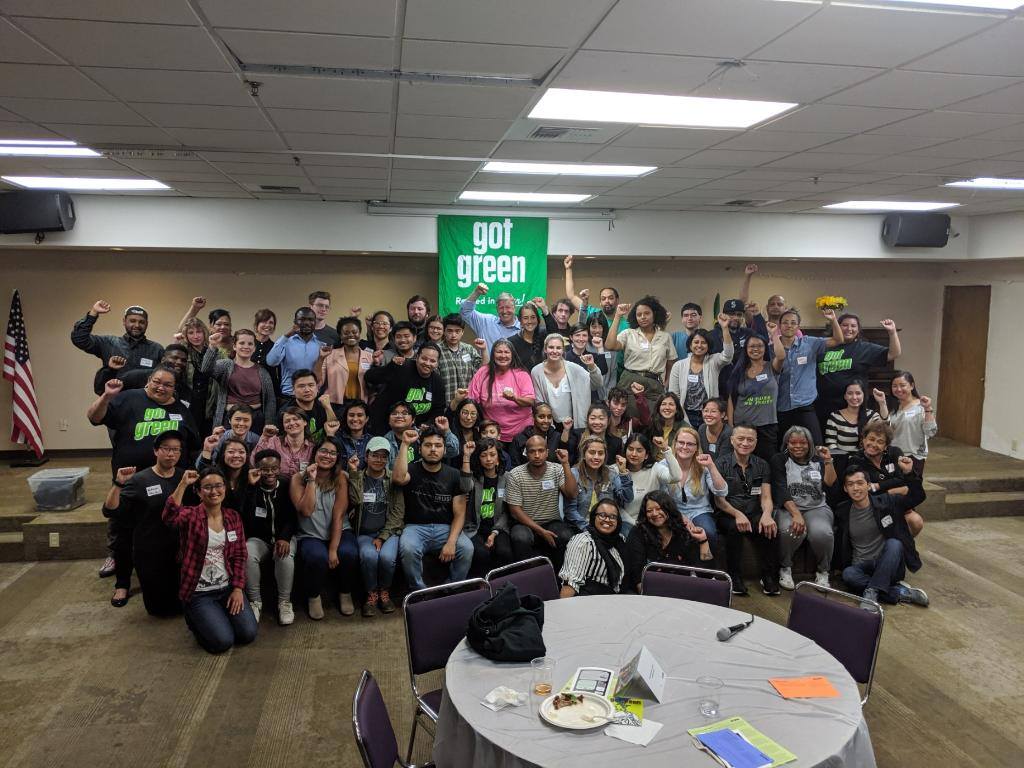
By Guest Contributor: James Williams, Got Green's Organizing Director
At Got Green, we feel the energy and national conversation sparked by the Green New Deal as proposed by Alexandria Ocasio Cortez is a good thing. It signifies a moment of possibility to make societal change on a massive scale. Recognition of the Climate Crisis and the fact that we must restructure our lives to survive impending environmental disasters has captured the imaginations of those across generations. All of that is much needed in these times.
To realize the vision of the Green New Deal, there is still need for clarification of key points and tightening of language around goals. Furthermore, we feel strongly that any policy which grows from the current resolution should prioritize ongoing efforts by frontline communities to both build resiliency (capacity to bounce back after a climate disaster) and also to replace dirty energy infrastructure (through the just transition to a regenerative economy). Such policy is needed on a national and local level.
Historical context: Despite all the media buzz and what the name may imply, the concept of a Green New Deal is not new. In 2006, we saw “Green New Deal” popping up on the national platform of the Green Party (first in Europe, then the United States). In 2008, something very similar was introduced at the United Nations called the “Global Green Deal”. In 2017, The University of Massachusetts Amherst published a more localized version of the concept in a paper called “A Green New Deal for Washington State”.
Even before that, Common Ground Collective in New Orleans, Louisiana led organizing for a Regenerative Economy and had projects around Energy Democracy in the aftermath of Hurricane Katrina. In 2006, Van Jones wrote a book calling for massive national investments to grow the green economy, an equity lens to concentrate opportunity in historically oppressed communities, and a plan to transition the country to clean energy. In 1993, an organization called Community Coalition for Environmental Justice was born in Seattle, Washington. This was one of the first formations in the country of black and brown folk coming together on a grassroots level to organize, mobilize, and educate our communities around issues of environmental justice. The language of Environmental Justice and ideas proposed in the Green New Deal are not new to Communities of Color. On the contrary, much of it comes from us. In truth, frontline communities are already fighting for many of the concepts.
Now more than ever, work must be put in to keep our movement from being co-opted. In other words, I feel some of the biggest threats to movements for Climate Justice right now is privileged folk stealing words from frontline communities, Big Green Non-Profits soaking up finite movement resources and/or organizing to support false solutions that Frontline Communities already know don’t work.
To sort the real from fake, ask questions about who makes decisions and how organizations or campaigns practice accountability to individuals and families most affected by what is being worked on.
What All It Means to Seattle: Locally, Got Green is leading a coalition to pass a Seattle version of the Green New Deal. We are knocking on doors and sharing hard truths about what climate change means and how low income black and brown communities are always hit first and worst. We’re also having conversations about what folks need, and how we can best support them. Right now, we are fighting to create a fair and equitable future by providing all residents with what they need to thrive. In order to build this, Seattle’s Green New Deal must include community control of development, affordable housing, rooted communities, living-wage jobs, public transportation, healthy food, renewable energy, clean air, water, and land, and corporate accountability in the bundle we are calling Seattle Green New Deal.
At Got Green, we believe that local policy needs to recommend substantial investment from the federal, state, and local level to kick start, support, and scale up frontline community-led work on:
-
Living-wage jobs that benefit or conserve the environment and preserve or expand environmental health for workers and the surrounding community
-
Living-wage and unionized jobs in the renewable energy and building trades sectors
-
Renewable, local energy infrastructure, including solar, wind, battery-storage, and other community-owned and -driven energy solutions
-
Rapid, convenient, affordable, and electrified public transportation
-
Energy-efficient, affordable housing and capacity to weatherize existing housing stock
-
Support for workers and businesses transitioning out of the fossil fuel industry and into renewable energy or other industries, including job training and pension security
-
Support with energy bills, weatherization, and transportation costs for low-income people
In conclusion, I just want to reiterate that the Climate Crisis is a daunting challenge, and one that will undoubtedly force us to restructure the way we live and interact with the world. But thisis also a moment to right historical wrongs and lift communities who have been underserved for generations. We can finally breathe life into countless promises and feel-good language around equity that local politicians like to use around election times.
Now is an opportunity to shape a better world for our children and grandchildren to raise families in. Now is the time to build a more just future where all residents can thrive.
How To Plug In - Help Speak Truth to Power:
What: Send this tweet to Seattle Mayor Jenny Durkan: "It has been 43 days since @350_Seattle and @gotgreenseattle delivered our letter and still no response from @MayorJenny. #SeattleGND #ClimateJusticeNow @SeattleGND”
When: This action is ongoing (I send at least 1 every day with an updated count of days -- we delivered the letter on June 18th, 2019)
Where: Send tweets to @MayorJenny
Join the team: By joining our Seattle Green New Deal Action Team, you will be the first to know about opportunities to eliminate climate pollution by 2030, address historical injustices, and create thousands of green jobs in the process.